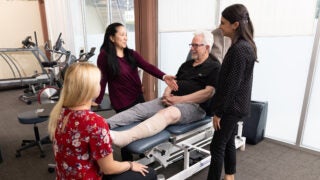Keck School of Medicine of USC research demonstrates teenagers who use e-cigarettes may be transitioning to tobacco products
Scientists say more study is needed on the link between e-cigarettes and tobacco use
Contact: Leslie Ridgeway at (323) 442-2823 or lridgewa@usc.edu.
To watch a video on the research, go to http://jama.jamanetwork.com/article.aspx?doi=10.1001/jama.2015.8950 (Link live on Aug. 18)
For a copy of the study, please email the JAMA press office at mediarelations@jamanetwork.org.
LOS ANGELES — A multi-university team led by Keck Medicine of the University of Southern California (USC) researchers has found, for the first time, that using or “vaping” of electronic cigarettes is associated with a propensity to start smoking cigarettes or other, harmful tobacco products.
Based on a survey of 2,530 14-year-olds at 10 public high schools in Los Angeles, the team found that teens who use e-cigarettes were more likely to transition to smokeable tobacco products. However, researchers cautioned that additional studies are needed to determine whether the association is causal.
The findings were published on Aug. 18 in the peer-reviewed Journal of the American Medical Association.
“E-cigarettes may be drawing a new generation of teens into recreational nicotine use because they are high-tech, can be purchased somewhat easily, come in enticing flavors and have a perception that they’re not harmful,” said Adam Leventhal, Ph.D., associate professor and director of the USC Health, Emotion, & Addiction Laboratory (USC-HEAL) at the Keck School of Medicine. “Some e-cigarette devices appear to be very efficient at delivering nicotine to the lungs and brain. If you enjoy the experience of inhaling nicotine in e-cigarettes, it makes sense that you would be open to trying other nicotine products, like cigarettes, hookah, and cigars.”
The research is among the first to be released by a Tobacco Center of Regulatory Science (TCORS), funded by the federal Food and Drug Administration through the National Institutes of Health (NIH). One of 14 TCORS was established in 2013 at the Department of Preventive Medicine at the Keck School of Medicine.
The longitudinal study included 2,530 students who had never smoked tobacco when they were first surveyed at the start of ninth grade. Of these students, at the first survey, 222 had used e-cigarettes (also known as “vaping”) and 2,308 had never vaped. The students were surveyed again in six months and 12 months. By the six-month mark, 30.7 percent of the e-cigarette users had started smoking one or more combustible tobacco products including cigarettes, cigars and hookahs, as compared with 8.1 percent who had never used e-cigarettes. At the 12-month mark, as the students were heading into 10th grade, differences in rates of tobacco smoking persisted between students who had used e-cigarettes versus those who had not.
Leventhal’s research team conducted the e-cigarette study as part of a larger substance abuse and mental health study funded by the National Institute on Drug Abuse (NIDA).
The research team includes Matthew Kirkpatrick, Ph.D., Jennifer Unger, Ph.D., Steve Sussman, Ph.D., Matthew Stone, B.A., Rubin Khoddam, M.A. and Jonathan Samet, M.D., M.S. (USC); Janet Audrain-McGovern, Ph.D. (University of Pennsylvania), David Strong, Ph.D. (University of California, San Diego), and Nathaniel Riggs, Ph.D. (Colorado State University).
The research, “Association of electronic cigarette use with initiation of combustible tobacco product smoking in early adolescence,” was published online ahead of print in JAMA on Aug. 18, 2015. The study was funded by the NIH, through NIDA under R01-DA033296 and the National Cancer Institute under P50-CA180905.
###
Leventhal, A.M., Strong, D.R., Kirkpatrick, M.G., Unger, J.B., Sussman, S., Riggs, N.R., Stone, M.D., Khoddam, R., Samet, J.M., Audrain-McGovern, J. (2015). Association of electronic cigarette use with initiation of combustible tobacco product smoking in early adolescence. Journal of the American Medical Association, 314(7): 700-707. Published online Aug. 18, 2015; doi:10.1001/jama.2015.8950
###
ABOUT KECK MEDICINE OF USC
Keck Medicine of USC is the University of Southern California’s medical enterprise, one of only two university-based medical systems in the Los Angeles area. Encompassing academic, research and clinical excellence, the medical system attracts internationally renowned experts who teach and practice at the Keck School of Medicine of USC, the region’s first medical school; includes the renowned USC Norris Comprehensive Cancer Center, one of the first comprehensive cancer centers established by the National Institutes of Health (NIH) in the United States; has a medical faculty practice, the USC Care Medical Group; operates the Keck Medical Center of USC, which includes two acute care hospitals: 401-licensed bed Keck Hospital of USC and 60-licensed bed USC Norris Cancer Hospital; and owns USC Verdugo Hills Hospital, a 158-licensed bed community hospital. It also includes more than 40 outpatient facilities, some at affiliated hospitals, in Los Angeles, Orange, Kern, Tulare and Ventura counties.
In 2015, U.S. News & World Report ranked Keck Medical Center of USC among the Top 10 in ophthalmology and among the Top 50 hospitals in the United States for urology and cancer care.
For more information, go to www.keckmedicine.org/beyond.


